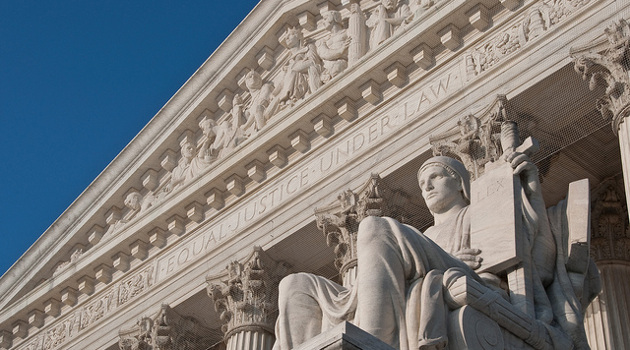Some of my right-wing friends complain about “judicial activism,” which seems to mean that they want courts to defer to other branches of government.
Since I’m opposed to majoritarianism and because I want courts to defend and protect all parts of the Constitution, I put together this visual to illustrate why I think they’ve picked the wrong goal.
This handful of examples is designed to make clear that “activism” is sometimes appropriate.
But not always, which is why constitutionalism should be the right goal.
In a column for Reason, Damon Root gives a good example of what this means.
In 1938 the Supreme Court concocted a bifurcated approach to judicial review that treats some constitutional rights as more equal than others. If a law or regulation infringes on a right that the Court has deemed fundamental (such as freedom of speech or the right to vote), the Court said in United States v. Carolene Products Co., the judiciary should presume that law or regulation to be unconstitutional and subject it to “more exacting judicial scrutiny.” By contrast, in cases dealing with “regulatory legislation affecting ordinary commercial transactions,” Carolene Products stated,
“the existence of facts supporting the legislative judgment is to be presumed.” In other words, judges are supposed to tip the scales in favor of lawmakers when economic liberty might be at stake. Now known as the rational-basis test, this rubber stamp approach has led to some truly dreadful judgments. …the rational-basis standard…runs counter to the text and history of the 14th Amendment, which was written, ratified, and originally understood to protect (among other rights) the right to economic liberty. In the words of Rep. John Bingham (R), the Ohio congressman who served as the principal author of Section One of the 14th Amendment in 1866, “the provisions of the Constitution guaranteeing rights, privileges, and immunities” includes “the constitutional liberty…to work in an honest calling and contribute by your toil in some sort to the support of yourself, to the support of your fellow men, and to be secure in the enjoyment of the fruits of your toil.”
Sounds like United States v. Carolene Products Co. ranks up there with Wickard v. Filburn as one of the Supreme Court’s worst decisions.
George Will shares some thoughts on the proper role of the judiciary in his Washington Post column.
For every American, a courtroom should be a level playing field, with the law blind to the “identity, power, and resources of the litigants.” This is not, however, the reality when an individual challenges a statute’s constitutionality. The tilted field favors the government — meaning legislative majorities — because federal jurisprudence invented, and…states have reflexively adopted, the presumption of constitutionality.
…In Federalist No. 78, Alexander Hamilton wrote that “the courts were designed to be an intermediate body between the people and the legislature, in order, among other things, to keep the latter within the limits assigned to their authority.” However, the presumption of statutory constitutionality has this practical consequence: Although the members of all three branches of government swear constitutional oaths, legislatures enjoy practical primacy. …Clark Neily notes that between 1954 and 2002, the U.S. Supreme Court invalidated 0.65 percent of the laws Congress passed (103 of 15,817), 0.5 percent of federal regulations and less than 0.05 percent of state laws. Those who praise such judicial passivity must implausibly assume, as Neily says, that government “hits the constitutional strike zone” at least 99.5 percent of the time. How likely is this? Judicial passivity has been encouraged by decades of reflexive conservative denunciations of “judicial activism.” These denunciations have been paired with celebrations of “judicial deference” to legislative majoritarianism.
Mr. Will has made a strong argument that we could use a bit more “activism” and a bit less “deference.” Properly defined, of course.
 Properly defined, of course. Looking at the image to the right, I want an activist judiciary when the tree is outside the fence and a deferential judiciary when the tree is inside the fence.
Properly defined, of course. Looking at the image to the right, I want an activist judiciary when the tree is outside the fence and a deferential judiciary when the tree is inside the fence.
And that doesn’t necessarily mean libertarian policy.
For instance, the Constitution does include a postal service as one of the enumerated powers. That doesn’t mean the federal government is obliged to set up post offices, but they certainly have that right.
And, thanks to the unfortunate mistake of the 16th Amendment, our wretched internal revenue code passes constitutional muster (though having the authority to tax is not the same as the authority to spend).
P.S. You won’t be surprised to learn that E.J. Dionne is against the right kind of judicial activism.
P.P.S. Several people have messaged me over the years to ask about abortion and the Constitution. That’s not my area of expertise, but I’ll simply observe that it won’t make much difference if Roe vs. Wade is overturned. All that would happen is that legislatures would be in charge and many states would allow abortion on demand.
P.P.P.S. I also get asked about the advisability of a balanced budget amendment. That might be better than nothing, but a spending cap provision (similar to what exists in Switzerland, Hong Kong, and Colorado) would be far preferable.
———
Image credit: Mark Fischer | CC BY-SA 2.0.


